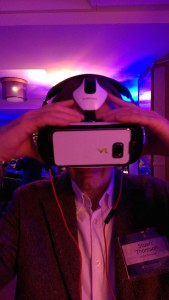
After more than 40 years of operation, DTVE is closing its doors and our website will no longer be updated daily. Thank you for all of your support.
VR still faces significant challenges, MWC attendees told
 Virtual reality (VR) still faces significant challenges before it becomes a mainstream entertainment offering, according to a panel of VR technology and content providers at this week’s Mobile World Congress in Barcelona.
Virtual reality (VR) still faces significant challenges before it becomes a mainstream entertainment offering, according to a panel of VR technology and content providers at this week’s Mobile World Congress in Barcelona.
Mihai Pohontu, VP emerging platforms, Samsung said that “monetisation opportunities are few” at the moment. “There are not many opportunities for developers to make money. This is the reason we created the ‘Made for Samsung’ programme,” he told attendees, referring to Samsung’s initiative to spur innovation that supports applications for its Galaxy devices.
For Pohontu, the confusion around the VR experience created by a mix of high-end headsets and lower-end consumer equipment is unlikely to be a problem. He said that the likes of Gear VR and Google Cardboard were “perfect introductions” to VR that would not put people off. He said these could be gateways to lead consumers to higher resolution devices. “The diversity of options is healthy for the medium,” he said.
Samsung is organising a developers conference featuring VR that will take place on April 27-28 in San Francisco.
Edward Tang, chief strategy officer and co-founder of VR technology outfit Avegant said that the quality on headsets is “not quite there yet” to display content to its best advantage. Tang said the hardware suppliers faced challenges and that people are not making much money, even from high–end headsets.
Arthur van Hoff, CTO and co-founder of VR content provider Jaunt said that playback on mobile devices still consumed too much power. Battery life and resolution need to be improved as well as there being a need for “lateral headtracking” capability in mobile devices, he said
Van Hoff admitted that content is also still in short supply. He said the “low hanging fruit is sponsored content. Once there is enough content and new content every week [things will begin to take off but]…one or two [titles] are not enough for subscription.” Van Hoff said that more content would enable companies in the space to begin to develop viable business models. “Then we will be able to do subscription as a model but that is going to take a couple of years,” he said.
As part of that process of adding to the supply of content, Van Hoff said that Jaunt is creating a new six-part series with The Bourne Identity director Doug Lyman. “If you use real talent and great production expertise you can do something on a par with movies today,” he said, although VR content is typically shorter form. “They are not exactly like movies but they are extremely compelling. We are getting closer to that level of production,” said Van Hoff.
Myles McGovern, CEO, Immersive Media, also speaking on the panel, said current projects were often funded by brands, but added that this was no different from how media evolved in the past. He said that VR would capture the imagination of a wider public as content becomes more widely available. “It is addictive. People put on the headsets and they have that immersive smile. You need to evolve this to tell good stories in that environment. It is what we call spherical storytelling,” he said.
Other content forms that panellists felt could be appealing to a wider audience included – apart from games – home shopping, social applications and tele-medicine.


